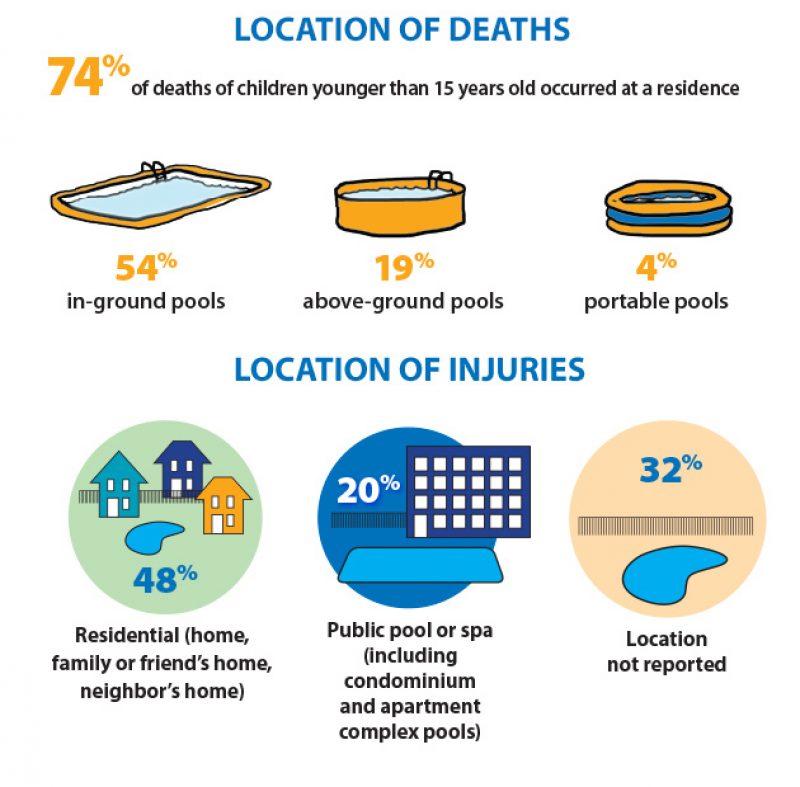This past weekend, 19 month-old Emeline Miller, daughter of Olympic skier Bode Miller, tragically drowned in a California swimming pool. Summer is here, and while swimming pools are perfect spots to gather with family and friends to enjoy the warmer temperature, they can also present serious dangers if not properly secured and supervised.
In a 2017 report, the Consumer Product Safety Commission estimated 5,900 pool or spa-related drowning injuries each year for 2014-2016. Children younger than 5 years old made up 74% of this population. The report also found 356 pool or spa-related drownings reported per year for 2012- 2014, involving children younger than 15 years of age. More than half of these incidents occurred at a residence. In fact, residential in-ground pools pose the highest risk for drowning injuries.

Graphic provided by:
www.PoolSafely.Gov/know-the-facts-drowning-deaths-and-injuries-by-location/
Massachusetts Laws for Pool Safety
The Commonwealth of Massachusetts has multiple regulations in place for the construction and design of residential pools to prevent pool-related accidents.
Fencing
All pools in Massachusetts must:
- Be enclosed by a fence or other structure at least four feet high
- Have locking gates
- Have the lock four feet above ground (or more) to keep away from small children.
If someone suffers a personal injury or drowning in a residential pool that was not properly fenced in, the homeowner can be liable for those injuries.
Portable Pools
In recent years, portable pools have added to the drowning risk. While many portable swimming pools are inexpensive, and are relatively shallow and easy to assemble, people often fail to realize the risks associated with these pools. Portable pools carry the same safety requirements as other above-ground pools, and a homeowner may be held liable if someone is injured as a result of the failure to take these precautions.
Diving Boards
Diving into shallow water can cause fatal head and spinal cord injuries. A homeowner has no duty to warn and no liability for someone who dives into the shallow end of a pool because that is an open and obvious danger. Despite not having those legal obligations, homeowners still need to be aware of other regulations.
For example, they should know how deep the water must be (at least nine feet), and how high the structure must be from the water (and for hand and guard rail requirements). Additionally, homeowner’s insurance policies may have their own requirements.
Pool Slides
In 2011, SUGARMAN secured a $20.6 million award for the family of a young mother who was killed after an inflatable pool slide partially collapsed while she was using it. The slide has since been recalled.
All pool slides, both permanent and inflatable, must meet federal government safety regulations. Beyond that, homeowners with pool slides must be aware of the hazards they present and take care with guests using them.
Tips to keep your children safe during pool time
- Never leave a child unattended
- Make sure children know how to swim
- Educate children to stay away from pool drains
- Teach children to not swim when they are tired
- Ensure all pools have drain covers
- Install barriers, cover, and alarms as required
- Know CPR
(This list provided by https://www.poolsafely.gov/parents/safety-tips.)
If you or a family member suffered a pool-related injury, you should consult with a injury lawyer in Boston immediately. SUGARMAN lawyers specialize in premises and product liability claims. Call us at 617-542-1000, email , or fill out a Contact Form.
